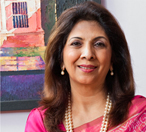Just back fresh from a rejuvenating trip, Dr Indu Shahani is teeming with ideas. Some from her experiences abroad, some from her constant conversations and interaction with her students, and some, just from the thinker that she is! Ideas that can be implemented for a better education system; and those that will cater to the common denominator of students in the country. Little wonder that, since she’s been the Sheriff of Mumbai since 2008. An educationist par excellence, Dr Shahani is a member of the committee on vocationalisation at the University Grants Commission (UGC); a member of the International Baccalaureate (IB) education committee and the IB Asia-Pacific regional advisory committee. She is also on the Academic Council of the Lintas’ Northpoint Centre of Learning. As a visiting faculty member at the UC Berkeley and NYU Stern, USA, she has had umpteen experiences to compare and contrast the India’s education system to the West and find a point where the twain can meet.
“What I found is that the educational systems are quite different in India and the West. Also, anything in the system is really a matter of demand and supply,” she opines. Dr Shahani adds, “In India, we are overwhelmed by numbers, as 50 per cent of India’s population is under the age of 25, which needs to be catered to by our education system.” Owing to the relatively lower percentage of students in higher education, the West can offer a large number of choices in academic programmes. Another point of contrast observed by Dr Shahani is the student-teacher ratio, which is much lower in the West.
This is evident as in an average class in the West the ratio is 25:1 compared to India’s average of 60:1. Of course, that too is an offshoot of large numbers. As a result, better infrastructure is available in educational institutions, coupled with the fact that the budget allocation for education and research is considerably higher in the West. Not one to discredit our system, Dr Shahani is quick to point out: “Having said that, the Indian education system has done considerably well despite the challenges of growing numbers.”
With the Indian education system struggling to keep up with its developed counterparts across the globe, corporatisation of education institutes has been proving to be an effective solution. What then, is its flipside? “As the demand for educational institutions grows, there is going to be a tendency for corporatisation of education. However, that does not necessarily mean that it has a bad effect because this actually brings in professionalisation in education,” believes Dr Shahani, who has over 31 years of teaching experience. In fact, Dr Shahani has worked toward significant collaboration between industry and academia.
But isn’t this in direct contradiction to the quota system that has been an extremely resented part of our education system, which gives importance to quotas over merit? Don’t many unfortunate open-category students lose out on a seat, despite having the requisite marks, since it has been swallowed up by some kind of quota? Dr Shahani sets the thought straight: “The quota system is often required, otherwise students from underprivileged backgrounds may not get equal opportunities.”
This vision, coupled with other things had led Dr Shahani to be the award-winning woman of substance that we know. One of the most important things she feels should be implemented in all institutions is independent thinking. HR College was given autonomy a few years ago, but couldn’t be implemented due to some technical regulations. “The college, however, functions with an autonomous mind as the staff and students are independent thinkers,” is her last take.
In the moment…
Dr Shahani is quite optimistic about the variety of choices available to students today, from vocational careers to study abroad. She herself has graduated from Sydenham College in Mumbai and holds a PhD in Commerce from the University of Mumbai. “If I was 17 today, ” she says, “I would opt for liberal arts as I feel that I have missed out on studying English literature and psychology, which I would have enjoyed to study.”
Sherrif’s take
On assuming charge as Sheriff of Mumbai, Dr Shahani launched the Women’s Helpline 1298 with the support of twenty leading NGOs; promoted voluntary blood donation for the citizens to free the patients from the pressure of procuring blood; harnessed student energy for the Municipal Corporation’s Clean-Up Mumbai Campaign where the student volunteers would blow the Sheriff’s whistle to keep Mumbai city clean; initiated the much-needed Green Mumbai Project; and provided for clean drinking water in the Mumbai district jail.
Dr Shahani has led Sheriff’s delegations to interact with premier institutions and universities in the UK, Europe, USA, Australia, New Zealand, Quebec City, Montreal, Philippines, Brazil, Argentina, Singapore, and South Africa. She thinks that the actionable changes that can transform the lives of Mumbaikars are provision for smaller but better housing and cleaner public environment and spaces. These, she feels, would bring about a dramatic change in everyday living.
In a SNAPSHOT
- More freedom for education institutes for decision making
- More courses catering across student demographics
- Technology is an important part of education, makes students better prepared, and teachers better informed
- Sex education essential at school level, so students have no misconceptions about facts
- Extracurricular activities are important for all round development
Volume 1 Issue 1






























